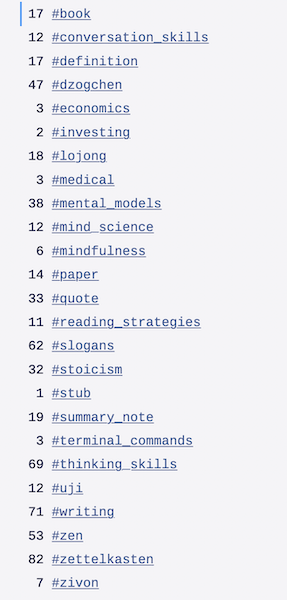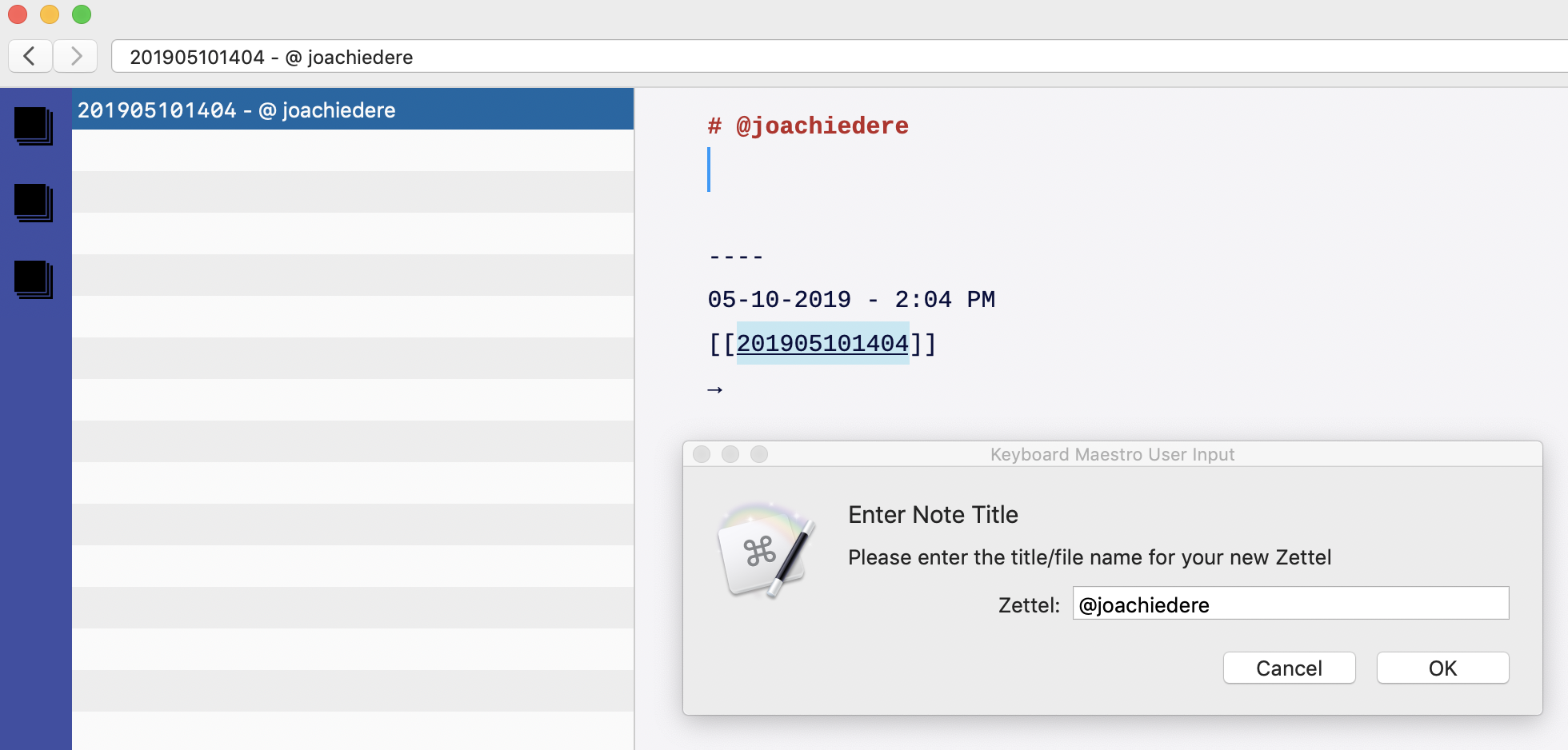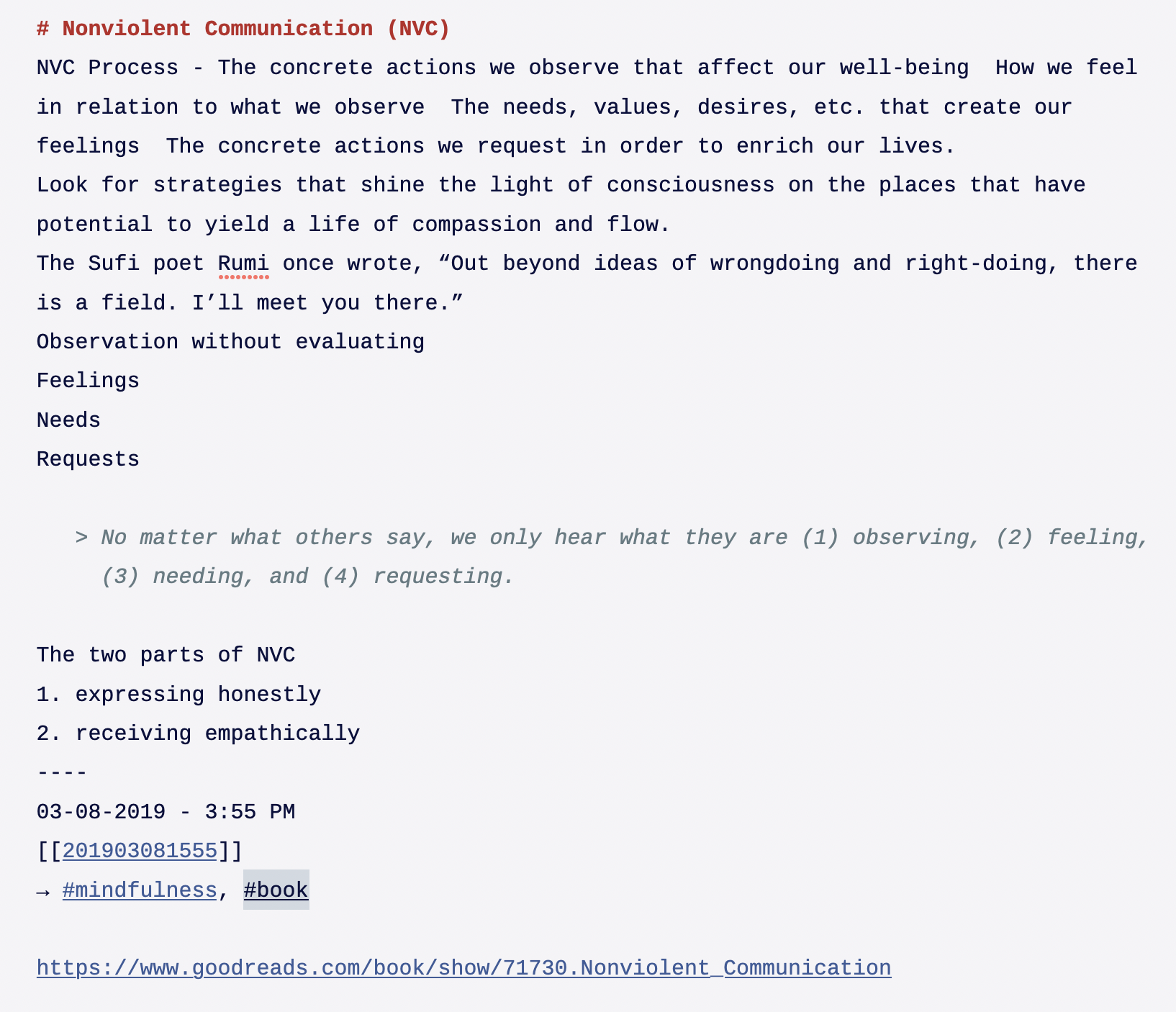Idea for categorizing theory, models, definitions, arguments and facts
Inspired by Sascha's post here, I have started to tag my zettels in the following way:
- #+t = Theory
- #+m = Model
- #+d = Definition
- #+a = Argument
- #+ca = Counter Argument
- #+f = Fact
Curious to hear your thoughts about this idea.
Howdy, Stranger!
Comments
I too am inspired by @Sascha's categorization of types of zettels. But the question I'll ask is how would this type of tagging help with our future self. Will it add value when using, assimilating, and combining zettels?. Knowing whether a note was a theory or a fact would have no relevance. If two different notes were about neurological T-Cells, then that becomes useful to my future self.
Personally, I've mostly stopped giving zettels tags prospectively. I'll tag a note when I 'use' it rather than when I create it and I try and keep tags to actual themes I work with.
Will Simpson
My peak cognition is behind me. One day soon, I will read my last book, write my last note, eat my last meal, and kiss my sweetie for the last time.
My Internet Home — My Now Page
Thanks for feedback @Will! You are right that I am thinking ahead since I so far only have 200 zettels and don't really need it. That is also why I am interested in hearing how you guys, who have a much bigger Zettelkasten, would have use of such tags. I am imagining that it could be a smart and quick way of for example comparing the similarities and differences between definitions or models that share certain attributes (read: #tags), and in this way discover connections and be able to develop new ideas.
It could maybe also be used as a 'thought tool' to force oneself to categorize what kind of zettel one is in the midst of writing, and consider if it is really worth writing it or if it should rather be divided into two separate zettels (or combined with some other piece of data) in order to constitute a worthy zettel. But maybe this kind of categorization is only a headache, I don't know.
@joachiedere your notion of using tags as a 'thought tool' is interesting. We should keep in mind a sort of 'checklist' while writing.
I'm not sure tags are the best trigger for this. At least they would not be for me. Your mileage may vary.
I too thought I'd be able to save time and shortcut my way to better tagging (see https://forum.zettelkasten.de/discussion/348/what-content-coding-convention-do-you-use-in-the-naming).
What I took away from all the discussion is to relax, let things grow organically. Tags can be added later and tags can be changed. Let tagging work for you as a serendipitous way of connecting notes and be careful of the Collection Fallacy.
Will Simpson
My peak cognition is behind me. One day soon, I will read my last book, write my last note, eat my last meal, and kiss my sweetie for the last time.
My Internet Home — My Now Page
@Will I think you are right. Letting things grow organically seems to be the right approach. The process should be very bottom-up, but it is so easy to get caught up in top-down thinking. I don't know why. Anyways, would it be possible for you to post some pictures of what your archive look like at the moment, so that I get a better idea of how you are dealing with content notes, structure notes, linking and referencing? Thanks for all advices.
Yes, we all are subject to the habit of top-down thinking if we are not careful. Likely partly evolutionary, partly cultural, partly mystery. Today is 'Deep Work' for me and I'm now on a break. I'm processing for my Zettelkasten an article from the Journal of Sonic Studies about John Cage's 'Lecture on Nothing'.
Here is a screenshot of the first note. One of a type. Hope this helps.
Will Simpson
My peak cognition is behind me. One day soon, I will read my last book, write my last note, eat my last meal, and kiss my sweetie for the last time.
My Internet Home — My Now Page
Thanks a lot, @Will! Looks good. Just a few questions:
Each note is different and this is a good list of types to strive for.
Tag Cloud is a note I created early that is basically an inventory of notes by tag.

Stub and Buffer are interchangeable terms I use of work in process. In this case, the note with the stub will ultimately be as TOC note combining notes from a long journal article and a book. The Buffer note is a compilation of notes and tasks for a book project. Most zettelkasten-aeronauts keep this type of note separate from their zettelkasten as it is large but only 6200 characters in this case. Most of my notes are usually less than 700 characters. These sort to the top of the note list and are kept in view till completed then I remove the prefix.
I use Keyboard Maestro to create and name my notes. It prompts for the text and prepends a zettel ID. It then creates the file, grabs a note template, and places the cursor for input.

This screenshot attempts to show two things. My initial template and the KM user prompt that I fill with the name. Note the note list. KM takes care of placing the note meta-info below the "----" timestamp, note ID, and the → is an homage to my "External Editor" (Typora) which needs something here to format tags correctly and a → is as good as anything. More thought wants to be spent on this but it is a low priority.
Summary notes in my world are glorified TOC notes with an overall summation of the book. Most of the "Summary" notes I have created are mostly note TOC with references and book metadata. This summary note has no note reference links.

Thanks for your questions. It is helping me better formulate my workflow and has pointed out a gap in how I treat "Summary" notes.
Will Simpson
My peak cognition is behind me. One day soon, I will read my last book, write my last note, eat my last meal, and kiss my sweetie for the last time.
My Internet Home — My Now Page
That is very helpful, @Will, thanks a lot! I will look into this tomorrow and might come back to you if there are things I do not understand. Also happy to hear that you got something out from this exchange too.
Did that. Didn't turn out very useful. But give it a try and report.
I am a Zettler
@Sascha Not sure which "that" you are referring to but if it the 'Tag Cloud' I agree. It has turned out to be not useful at all. Pretty but not useful. Plays to my tendency towards the Collection Fallacy. I didn't make this clear in my post. It has turned out to be less than useful. I've found so far the best way into a thought stream in my zettelkasten is either through a full-text search or note links. I'm still trying to find a usefulness for tags.
Will Simpson
My peak cognition is behind me. One day soon, I will read my last book, write my last note, eat my last meal, and kiss my sweetie for the last time.
My Internet Home — My Now Page
Oh. I am refering to the note categories.
I am a Zettler
@Sascha @Will I trust you and will not put any more efforts categorizing categories not worth of getting categorized.
How much wood could a woodchuck chuck if a woodchuck could chuck wood? Some notes take predictable forms and some don't. I'm learning to not force things but to relax into the organic evolution of my notes.
Will Simpson
My peak cognition is behind me. One day soon, I will read my last book, write my last note, eat my last meal, and kiss my sweetie for the last time.
My Internet Home — My Now Page